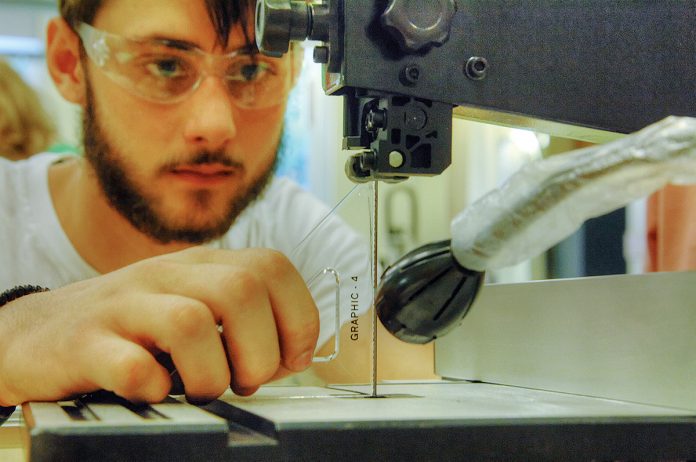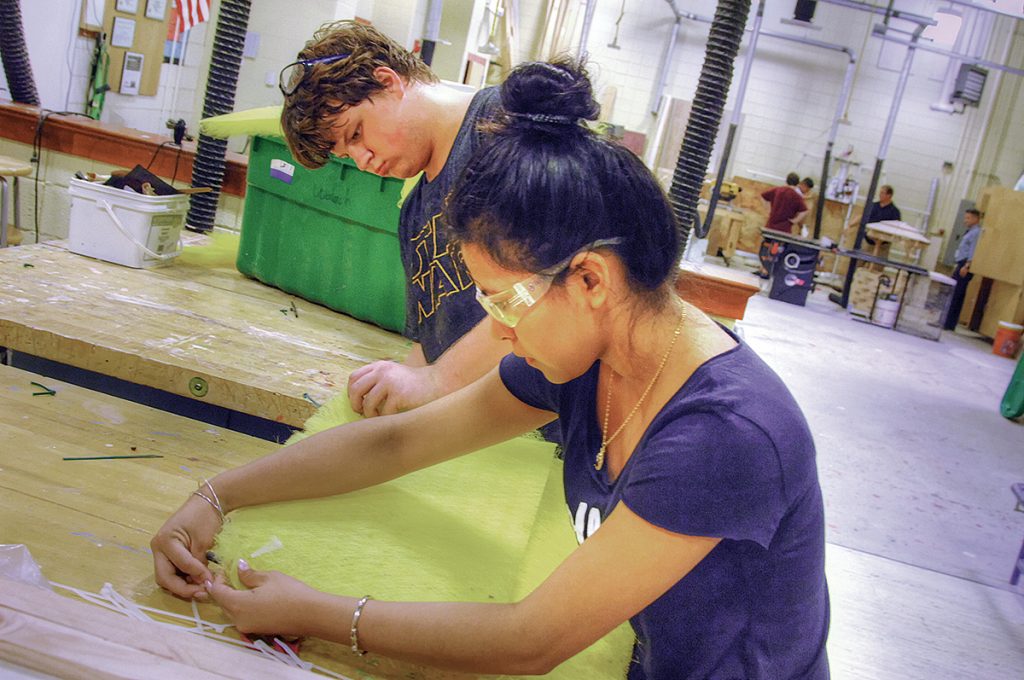
Connecting people and jobs is always a challenge, but in the manufacturing and construction sectors in Rhode Island, the process has become especially challenging since the Great Recession.
As makers and builders lost business, they also lost people, some who found jobs elsewhere, some who just retired. And now that they need to add staff to fulfill growing business orders, finding the right people is even more difficult. Call it the skills gap, one that is especially challenging when it comes to the next generation of workers.
To help close that gap, the state launched a new program last year, Prepare Rhode Island, which is a joint effort by the R.I. Department of Education, the Governor’s Workforce Board, the R.I. Office of the Postsecondary Commissioner and the R.I. Commerce Corp. In short, it is a new way to help the state’s youth find out what they need to know to land a position in today’s high-demand careers, from the trades to manufacturing as well as more academically oriented pathways.
“It’s an effort to get better results not only for our kids, families and communities, but also for our economy by better linking our higher education systems and our economic-development workforce development work,” R.I. Education Commissioner Ken Wagner said.
Where to begin
The program starts way before high school, by introducing elementary and middle school students to different career opportunities through guided exploration with school counselors and faculty. As they advance in school, students can explore careers in more depth, often through internships.
For many students, this exploration will lead them to careers in manufacturing and construction through coursework at school. According to data from RIDE, 1,338 students in the 2016-17 academic year took courses in architecture/construction and manufacturing. Currently, 25 schools offer 37 programs specializing in education and training in those fields.
Currently, 25 schools offer 37 programs specializing in education and training in those fields.
For example, students who take the Material Processing course at Ponaganset High School will learn how to use power tools to complete projects out of wood, plastic and metal, and calculate board feet, among other topics, according to the school’s course catalog.
The Residential Construction with Welding program at the Cranston Area Career and Technical Center, along with covering topics such as carpentry, plumbing, electrical and welding, also offers National Center for Construction Education & Research certification, 10 hours of Occupational Hazard and Safety Administration training, and requires training in financial literacy for graduation.
Gaining experience
PrepareRI offers a significant opportunity for students with its internship program. According to the organization’s website, paid summer internships are offered to high school juniors in Rhode Island based on their “preparedness, skill and interest.”
Along with gaining experience and earning a wage, students would also build connections with professionals in the field. Students can find internships on an interactive map at PrepareRI website, prepare-ri.org/internships-students/, showing a list of companies and organizations offering a first step toward a possible career.
Eligibility requirements for the internship program are that students must be entering the 12th grade, a Rhode Island resident, be enrolled in a Rhode Island public school, be at least 16 years old by a certain date, be eligible to work in the United States and fill out an online application through the website.
Demand for the internship program is high. RIDE spokesperson Megan Geoghegan said PrepareRI received more than 600 applications for 100 internship openings in the program’s first year. The demand prompted the Governor’s Workforce Board to fund 62 additional internship openings, she said.
P-TECH: A new and ongoing success story
The Pathways in Technology Early College High School initiative, or P-TECH, is part of PrepareRI’s initiative.

This model integrates a four-year high school diploma, a two-year associate degree from the Community College of Rhode Island and a partnership with an aligned business partner. General Dynamics Electric Boat and the Southeastern New England Defense Industry Alliance are among the partners participating in this program, R.I. Education Commissioner Ken Wagner said.
P-TECH’s benefit, Wagner said, is the student receives the education and skills needed for the workforce, while the business commits to giving the students a “first-in-line job” and a start to their careers.
“I think it’s a game-changing model to very explicitly align those three sectors in a way that benefits both the students and the employer,” Wagner said.
James Bessette is the PBN researcher.










